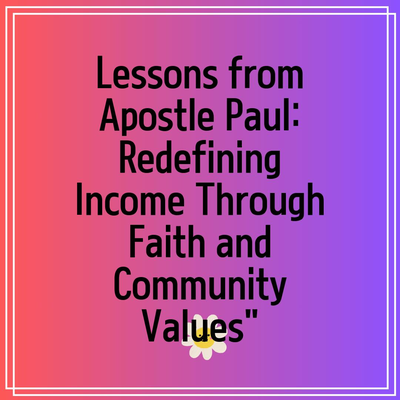
Understanding the Relevance of Apostle Paul’s Earnings in Contemporary Society
The teachings and life of the Apostle Paul have long served as a source of inspiration for countless individuals and communities throughout history. In today’s fast-paced world, the financial implications of his journey hold striking lessons for modern society. This exploration delves into how Paul’s concept of income can be interpreted through a modern lens while reflecting on the broader impacts of faith and ethics in our financial dealings.
The Apostle Paul’s Financial Journey
Apostle Paul, known for his missionary work and foundational role in the early Christian church, was not wealthy in a conventional sense. His earnings primarily came from his trade as a tentmaker, a profession that symbolizes hard work and self-sufficiency. Nonetheless, his ministry did receive financial support from various communities, which raises questions about the nature of income and the ethics surrounding it.
Paul’s approach to income was never about accumulating wealth for personal gain. Rather, he believed in using his resources to uplift others and spread the teachings of Christ. This selfless aspect of his financial outlook resonates in various discussions around financial ethics today, highlighting an essential distinction: earning should not equate to greed.
Contemporary Implications of Paul’s Earnings
Today, the concept of income is often intertwined with status and prestige. However, reflecting on Paul’s life, one can argue that income should serve a greater purpose. In modern society, many are reassessing their financial endeavors, focusing on sustainable living and ethical consumption. This paradigm shift echoes Paul’s ethos of living simply, emphasizing stewardship over lavishness.
Notably, organizations focused on
Faith and Finance: A Balancing Act
As Paul’s life exemplifies, navigating the intersection of faith and finance requires careful consideration. For believers and non-believers alike, finding a balance between ethical earning and responsible spending is crucial. Paul’s teachings encourage individuals to reflect on the purpose of their income and how it can enrich the lives of others.
Financial instability is a pressing concern in many communities today, and understanding Paul’s self-sufficiency may inspire others to look for sustainable ways to earn and give. Many are now finding ways to enhance their incomes without compromising their principles, similar to Paul’s tentmaking by balancing secular jobs with humanitarian efforts.
The Role of Community Support
Another significant aspect of Paul’s financial journey is the support from the communities he served. This creates a model for contemporary practices, where community support can serve as a pillar for those in need. Crowdfunding and cooperative economic models are modern manifestations of Paul’s reliance on his community for support. Such platforms facilitate collective financial assistance for ventures that aim for a positive societal impact, which further emphasizes that income can be a communal effort rather than a solitary pursuit.
Learning from Apostle Paul Today
In a world increasingly influenced by consumerism, the lessons drawn from Apostle Paul’s relationship with income serve as vital reminders. His life encourages a **reexamination** of our financial practices, urging individuals to consider the implications of their earnings on their communities and the world at large. Moreover, it asks us to challenge the norms surrounding wealth and instead focus on the potential for our resources to do good.
This transformation leads to greater awareness of our impact on society, promoting a shift towards ethical wealth accumulation that prioritizes collective upliftment over individual gain. As more people and organizations align with these principles, we move closer to the ideal Paul embodies—a life of purpose reflecting altruism rather than materialism.
Conclusion
In summary, the exploration of Apostle Paul’s earnings reveals vital insights into


